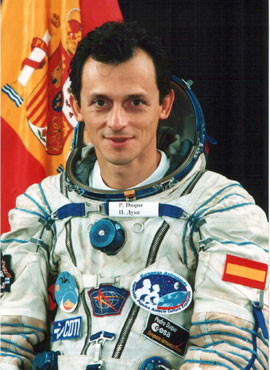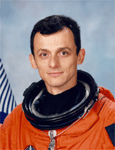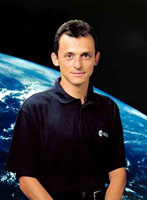RSC
Energia bio
(Aug 03) |
 Pedro
DUQUE Pedro
DUQUE
Flight Engineer-1 of the Soyuz TMA TSC and ISS VC,
ESA Astronaut, Spain
1st Astronaut of Spain
DATA AND PLACE OF BIRTH: Born March 14, 1963 in Madrid, Spain.
EDUCATION:
Graduated with a degree in Aeronautical Engineering from the Escuela
Tecnica Superior de Ingenieros Aeronautics, Universid Politecnica, Madrid
in 1986 and was trained for astronavigation.
FAMILY STATUS: Married, has three children.
SPECIAL HONOURS: Russian Order of Friendship awarded by President Boris
Yeltsin of the Russian Federation in March 1995 for participation in flight
under Euromir-94 program; Great Cross of Aeronautical Merit awarded by
the King of Spain in February 1999. "Principe de Asturials" prize for International
Cooperation shared with three other astronauts.
HOBBY: Diving, swimming and cycling.
WORK EXPERIENCE:
Upon graduation from the University he joined GMV flight dynamics group
(Grupo Mecanica de Vuelo). At the end of 1986 he moved to ESA's European
Space Operations Center (ESOC) in Darmstadt, Germany, where he worked in
the Precise Orbit Determination Group.
From 1986 to 1992 he worked on the development of models, algorithms
and implementation of SC orbit computation software. He was also part of
the Flight Control Team for ESA's ERS-1 satellite and EURECA.
In May 1992 he was selected as the ESA astronaut candidate.
Till the end of 1992 he completed the Introductory and Basic Training
Programs at the European Astronaut Center (EAC) in Cologne, Germany and
a four-week training program at Yu.A. Gagarin Cosmonaut Training Center,
Star City, Russia.
In January-July 1993 he passed a course of general space training at
EAC.
Since August 1993 he returned to Yu.A. Gagarin CTC to train for the
joint ESA-Russian Euromir 94 mission. Upon completion of training he was
qualified as a cosmonaut researcher for missions onboard the Soyuz TM spacecraft
and Mir Orbital Station.
From May to October 1994 he trained for a 30-day flight to Mir under
EC-17 program and Euromir 94 mission within a backup crew together with
Russian cosmonauts Yu.P. Gidzenko and S.V. Avdeev. On October 4, 1994 he
was a backup of the Soyuz TM-20 SC cosmonaut researcher, namely Ulf Merbold,
German astronaut, ESA.
During the joint flight under Euromir-94 program (from October 3 to
November 4, 1994) he performed functions of Crew Coordinator at the Russian
Mission Control Center (TsUP).
In January 1995 he began training at Yu.A. Gagarin CTC under the training
program for a 135-day flight (Euromir-95 mission). He participated in flight
of Thomas Reiter, German astronaut, ESA, onboard the Russian Complex Mir
in the latter half of 1995.
In May 1995 he was assigned as an Alternate Payload Specialist for
a flight onboard the Columbia Shuttle with laboratory LMS-1 (STS-78). During
the mission from June 20 to July 7, 1996 he performed functions of the
Crew Coordinator at Marchall Space Center, Huntsville, Alabama, USA.
From August 1996 to April 1998 Duque passed a course of general space
training at Johnson Space Center in Houston, Texas, USA and upon completion
of which he was qualified as a Mission Specialist.
In November 1997 he was selected by ESA for STS-95 mission and in February
1998 NASA declared his assignment to this crew.
He performed his first space flight from October 29 to November 7,
1998 as a Mission Specialist of the Discovery Shuttle (STS-95) with the
pressurized SPACEHAB module in the Shuttle payload bay. The following was
deployed during the mission: the Spartan free-flying satellite for observation
of the Sun and experimental platform for the Hubble Space Telescope Orbital
System and also a large scope of experiments was carried out. The mission
duration was 8 days 21 hr 43 min 57 s. Having performed this space flight
onboard the Discovery Shuttle he became the first astronaut of Spain which
in its turn became the 28-th country of the world a citizen of which performed
a space flight.
From October 2002 to February 2003 he was in training at Yu.A. Gagarin
CTC as a flight engineer-1 of the Soyuz TMA TSC of expedition crew-5, visiting
crew (VC-5) of the International Space Station.
His flight is planned to be performed in October 2003 and he is currently
training together with the ISS-8 expedition crew.
August 2003
By the data of ESA site and magazine News of Cosmonautics |
|




 Pedro
DUQUE
Pedro
DUQUE